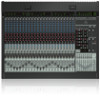Behringer EURODESK SX4882 Manual - Page 13
Connections, PFL/SOLO, Talkback, Rear panel
 |
View all Behringer EURODESK SX4882 manuals
Add to My Manuals
Save this manual to your list of manuals |
Page 13 highlights
13 EURODESK SX4882 User Manual 6.5 PFL/SOLO Complex headphone or stage monitoring networks could be constructed where HP 1 , HP 2 , aux 1 (pre), aux 2 (pre) and one or more subgroups all feed separate monitor mixes. (See section 16.2 "Very tricky headphones"). However, since the four pushbuttons are non-latching it might drive you crazy. If you are using many headphone feeds, you may find it easier to patch a separate microphone for talkback straight into a channel, where it can be routed pretty much anywhere. Engaging TALKBACK (S99) dims the control room (monitors, not lights) by -20 dB to restrict the possibility of feedback. All other talkback routes are unaffected. 7. Connections Fig. 6.6: Solo section 7.1 Rear panel 6.5.1 PFL Pressing S 95 disengages the stereo SOLO bus, and replaces it with a separate mono PFL (Pre-Fader-Listen) bus. Now anything at all which is SOLOed, isn't. It is PFLed instead. PFL should be used for gain-setting. (See also the essential section 13 "Start-up".) Expander port bus inputs If you want to add another console to your EURODESK SX4882, the expander port bus inputs give access to all subgroups, auxes and mix busses via an array of 1/4" jacks, situated top left on the rear panel. 6.5.2 SOLO SOLO is short for SOLO IN PLACE, and is the preferred method for auditioning an isolated signal or a group of signals. Whenever a SOLO button is pressed, all unselected channels are muted in the monitors. Stereo panning is maintained. The SOLO bus is derived from the output of the channel PANs, aux send/return pots, etc., and is always post fader. In addition to any local solo LEDs which might be activated, the ultra-bright MAIN SOLO LED ( L 95 ) illuminates whenever anything is SOLO/PFLed. P 94 controls the master SOLO/PFL level. Set to unity gain (center detente), this will match the mix level. 6.6 Talkback Fig. 7.1: Expander port bus inputs Auxiliary sends Unbalanced 1/4" jacks, wired tip = signal (+ve) and sleeve = ground/screen. They operate at +4 dBu. Fig. 6.7: Talkback The built in mic (above the main mix faders) allows you to converse with artists remotely. The most important controls are the VOLUME ( P 99 ) and PHONES & STUDIO button ( S 99 , see fig. 6.7). It is possible to route the talkback mic to any of the following: aux 1, aux 2, subgroups, and phones and studio ( S 96 to S 99 ). Fig. 7.2: Auxiliary sends behringer.com















